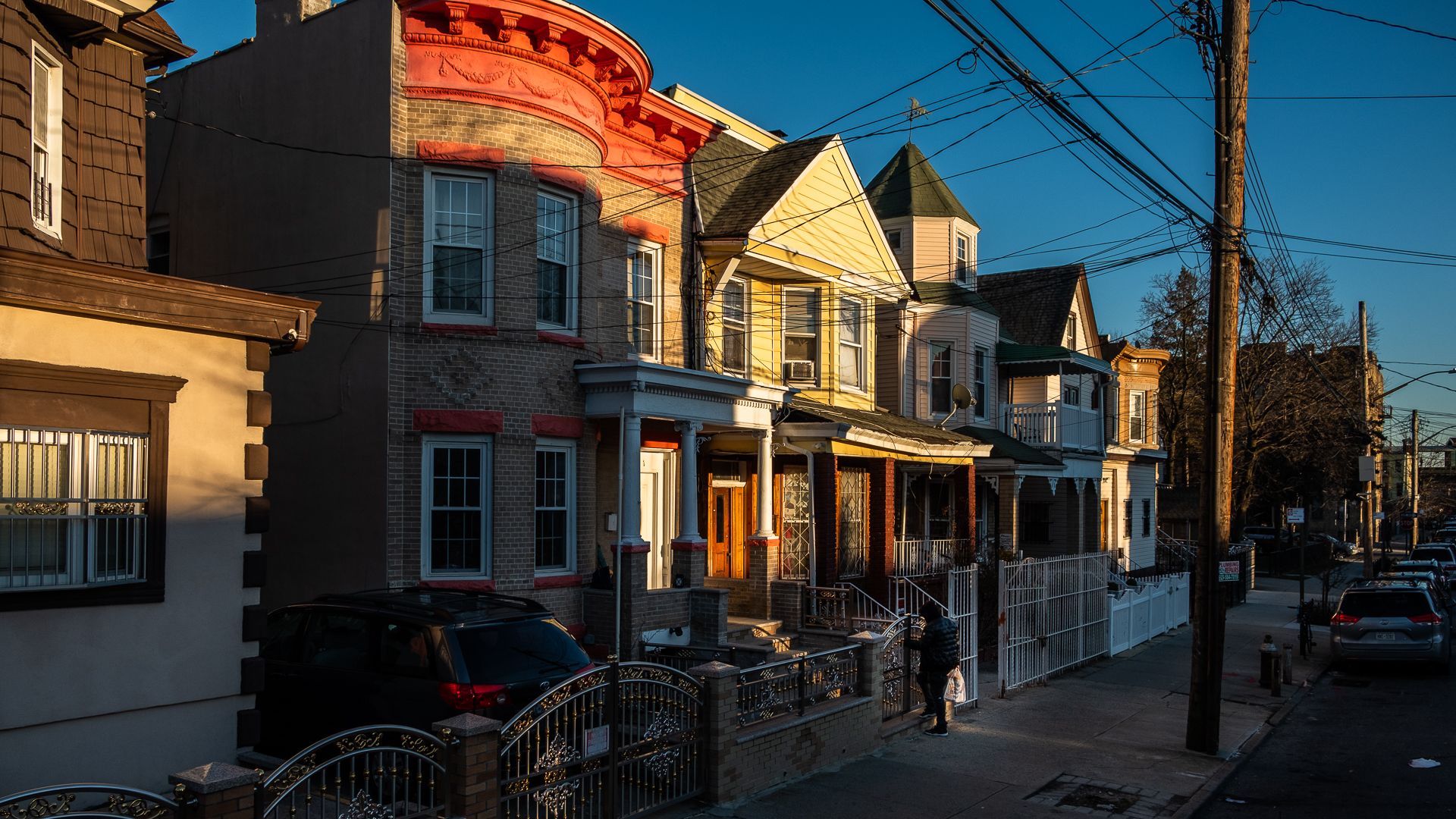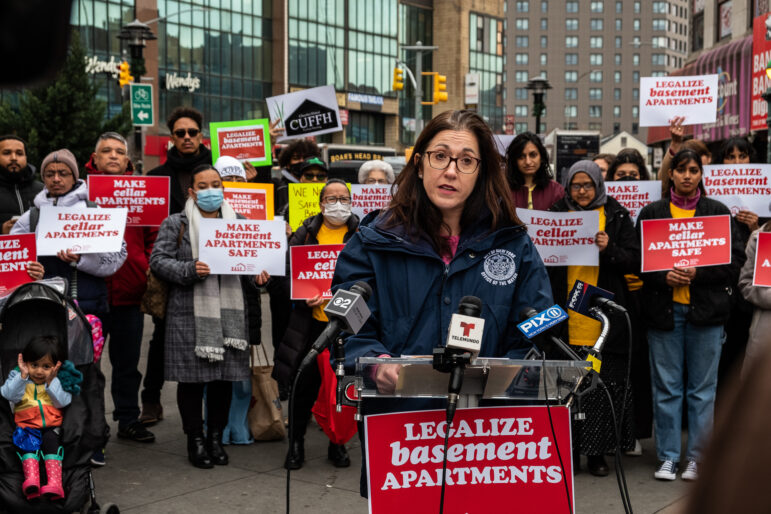“I’m surprised, I’m baffled, I’m angry,” said City Councilmember Sandy Nurse, who represents East New York, where the city ran an earlier basement conversion pilot in 2019. The area is excluded from the new program, which will only apply to 15 of the city’s 59 community districts.

Adi Talwar
Homes on Cleveland Street near Arlington Avenue in Brooklyn Community District 5, where the city launched a basement/cellar conversion pilot program in 2019. A new initiative authorized by the recent state budget excludes the area.A new pathway for the legalization and conversion of basement and cellar apartments in the city was included in this year’s state budget—but excludes many of the neighborhoods hardest hit by flooding in recent years.
Housing advocates have long called for a plan to regulate the estimated tens of thousands of subgrade apartments across the city, often low-cost units rented by working class and immigrant New Yorkers. Most existing basement and cellar homes are occupied illegally, making them more vulnerable to unsafe conditions, and tenants now face increased risk of flooding in the face of climate change-driven extreme weather.
“I was a brand new governor for about a week when Hurricane Ida hit. I walked those streets in Queens. I saw what happened in places and homes where people were flooded and literally drowned in their own home because they were trapped in those illegal basement apartments,” Gov. Kathy Hochul said on WNYC’s The Brian Lehrer Show on April 17. “That was one of the reasons I said we must bring them into code.”
But in a surprise, only a single Queens community district—CD 2, which encompasses Long Island City—was selected to participate in the pilot program authorized by the state budget, despite the wider region’s susceptibility to flooding and the basement drowning deaths of 11 people in other parts of the the borough during Hurricane Ida in 2021.
A total of 15 community districts were selected to participate in the five-year pilot, including four in the Bronx (districts 9, 10, 11, and 12), four in Brooklyn (districts 4, 10, 11 and 17), and six in Manhattan (district 3, 4, 9, 10, 11 and 12), but only one in Queens and none on Staten Island.
Just as surprising was the exclusion of Brooklyn Community District 5 (CD5) in East New York, which was the guinea pig for an earlier basement legalization pilot attempted under Mayor Bill de Blasio’s administration in 2019.
“This was a surprise. I’m extremely disappointed that CB5 [Community Board 5] was specifically excluded from this effort,” said City Councilmember Sandy Nurse, who represents the 37th Council District that includes East New York.
That earlier pilot program, while stymied in its reach by funding issues and other complications, also saw significant interest from property owners who wanted to take part.
“This would have been a home run for any state elected official to come back to CB5 and say [that] we got this for the district, given that almost 1,000 households wanted to participate,” Nurse added.
Now, the onus lies with the city to devise and implement the pilot program. Projects in the community districts selected by the state would, in essence, be exempt from parts of the state’s Multiple Dwelling Law (MDL), which regulates the construction, maintenance, and safety standards of buildings containing three or more residential units.
It was a major barrier to the success of the city’s earlier East New York pilot, kicking in when a two-family home sought to legalize its basement or cellar, subjecting those properties to stricter regulatory requirements and driving up the costs of conversions.
The City Council must now pass legislation to institute the new program, define its implementation approach, and decide how or if the MDL exception will function within these community districts, according to a city staffer.
While the budget deal granted the city the authority to establish a legalization program within the designated community districts, it’s separate from any actual funding for conversions, with the financing framework for the pilot still to be determined.
One potential avenue for funding lies in the Plus One ADU program, announced in November, which incorporates a combination of state grants and city funding earmarked for owners to create or convert Accessory Dwelling Units (ADUs) on their properties, including basements. The program accommodates ADUs compliant with current regulations, which excludes many basement units due to the existing state MDL—though the city could now change that with its newly granted authority.
“We had set aside $85 million for ADU and basement conversions. The city is getting money every year from the state to do that,” said Assemblymember Harvey Epstein, who has sponsored a basement apartment legalization bill since 2021.
“We’ll see if they can use that money to help homeowners who need to do the conversion and assist them in ensuring that there’s affordable housing for them,” said Epstein, who called the budget deal on basements “an important first step.”
The basement initiative comes as the city embarks on an effort to ease other zoning rules to create more housing through Mayor Eric Adams’ City of Yes for Housing Opportunity, for which public review officially kicked off Monday.
Among the changes it seeks to make is to eliminate parking mandates for new residential development, which proved another hurdle for basement conversions in the East New York pilot: 36 percent of properties were dropped from the program during pre-screening because they couldn’t accommodate the required parking, according to a report last year from the Citizens Housing and Planning Council.
During a City of Yes Zoom press briefing on Friday, Department of City Planning Chair Dan Garodnick discussed how parking mandates had hindered housing creation and that by “eliminating a mandate, we will create much more flexibility for different types of housing across the board.”
“We think it’s important that we have the opportunity for a pilot to legalize basements. And, of course, zoning is a piece of that puzzle, but by no means the only piece of that puzzle. So we were really encouraged by what the state came up with,” he said.

Adi Talwar
Jessica Katz, the city’s former chief housing officer, speaking at a March 2023 rally for basement legalization in Jackson Heights. The neighborhood is excluded from the pilot program authorized by the recent state budget deal.In a statement following release of the state budget, the BASE Coalition, a collective advocating for a safe pathway for basement apartment legalization, said the program “was long overdue” and would help improve safety in the community boards selected to participate.
“The City of New York now has significant power and opportunity to embark on a basement conversion program in many vulnerable communities,” the group said.
But the Coalition added that it is “extremely disappointed by the geographic limitations of this regulatory relief,” and “concerned by the lack of transparency regarding the selection process for eligible Community Districts.”
Sadia Rahman, deputy director of policy at Chhaya Community Development Corporation and a member of the BASE Coalition, said the city has already learned a lot from the original East New York pilot program.
“That was the beauty of the East New York pilot; it gave the city the opportunity to look under the hood and really tinker with and identify each of the provisions of the code that would need to be modified in order to make these conversions easier, and so a lot of that work has been done already for the pilot, and we just need to expand that citywide,” said Rahman.
Howard Slatkin, a former deputy at the New York City Department of City Planning and now executive director of the Citizens Housing & Planning Council, another BASE member, also criticized the geographic restrictions, alluding to potential political motives: some state lawmakers have opposed basement legalization, citing safety concerns.
“Calling this a ‘pilot’ was the fig leaf that allowed them to play politics with boundaries,” said Slatkin. “What we see instead is some version of political boundary salad that the state legislature has put out.”
State Sen. Brian Kavanagh, who sponsored the broader legalization bill with Epstein, acknowledged the opposition to a more comprehensive initiative.
“Some of my colleagues have argued that effectively you would be rewarding property owners for doing something that’s improper,” he told City Limits Monday. The smaller pilot, he added, “may allow people who have been skeptical of this approach to see its merits.”
“Getting a pilot in place that will allow the city to design a program, determine which aspects of the MDL are obstacles to legalizing, and making these apartments safe and launching the program is a very significant step forward,” he said.
But Councilmember Nurse called for those who pushed for the geographic exemptions to answer for those exclusions.
“I’m surprised, I’m baffled, I’m angry,” Nurse said, “and I think whoever got in the way of Community Board 5 participating and moving forward with the work we’ve been doing for almost a whole decade, I think that they’re gonna have to be held accountable for that.”
With additional reporting by Emma Whitford.
To reach the reporter behind this story, contact Chris@citylimits.org. To reach the editor, contact Jeanmarie@citylimits.org
Want to republish this story? Find City Limits’ reprint policy here.







